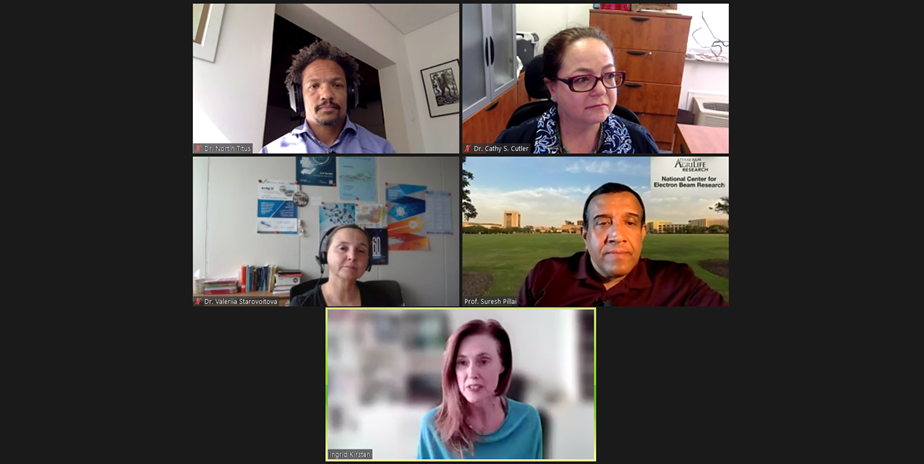
On 7 July 2022, the VCDNP hosted a webinar on the benefits of accelerator and X-ray technologies and their potential to expand access to nuclear technologies for health, the environment and food security in developing countries. Moderated by VCDNP Senior Research Associate Ingrid Kirsten, the panel included Dr. Nortin Titus, Chief Scientist, Namibian Department of Mines and Energy, Dr. Valeriia Starovoitova, IAEA Radiation Technology Coordination Officer, Dr. Cathy S. Cutler, Director of Medical Isotope Research & Production Program (MIRP) at Brookhaven National Laboratory, and Prof. Suresh Pillai, Director of the National Center for Electron Beam Research at Texas A&M University.
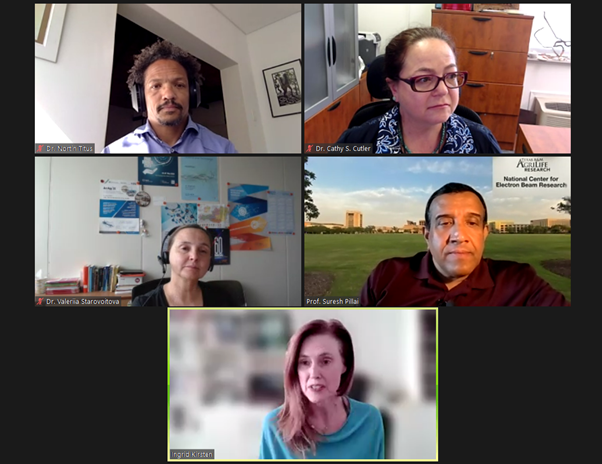
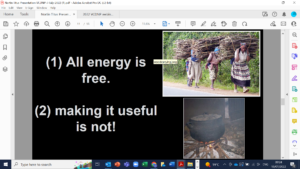
In his presentation, Dr. Titus quantified the immense impact that improved access to nuclear energy and nuclear technologies could have on the energy and food security challenges faced in developing countries. Nuclear energy would be crucial to meeting the predicted 1,000 TWh of additional electricity demand in Africa over the next 20 years, while taking up far less land than wind or solar parks. It would also be part of the solution for the 600 million people in Sub-Saharan Africa who still have no access to electricity, said Dr. Titus. Additionally, providing electricity to more people would have direct benefits for women empowerment. In Namibia, where 50 percent of the population still use wood for cooking, women spend a large part of their day collecting wood. Access to clean, electrical cooking would free up valuable time for education and self-development.
Additionally, being able to irradiate crops would significantly improve food security and support job creation in the agriculture sector, Dr. Titus explained. By killing pests, irradiation technology could safely extend the shelf life of fresh produce by at least four days, allowing farmers to sell more and consumers to transport and store food for longer. He also noted that Namibia should significantly increase the use of nuclear technology for cancer diagnosis and treatment as currently, only 6,000 nuclear medicine procedures (scans and treatments) are performed in Namibia annually, compared to more than 20 million procedures performed in the United States each year. For more information in this regard please refer to the VCDNP case study here on advancing access to radiotherapy in LMICs.
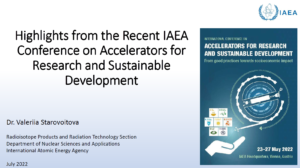
Next, Dr. Starovoitova provided a briefing on the IAEA Conference on Accelerators for Research and Sustainable Development, which was held in Vienna in May 2022. The hybrid Conference focussed on the potential of accelerators to contribute to achieving the Sustainable Development Goals (SDGs) and on ways to improve the cost-efficiency of accelerators and the public image of nuclear technology. The Conference also discussed IAEA support to improve access by developing countries to accelerator technologies through collaborating centres, coordinated research projects, technical cooperation projects, training and guidance documents.
Dr. Starovoitova spoke about the many ways in which accelerators facilitated the application of nuclear technology for health, environmental and cultural benefits. For example, accelerators enable more countries to produce the medical isotopes needed for cancer treatments directly inside medical facilities. Accelerators can also help to treat wastewater from livestock farms and pharmacological factories by breaking down harmful chemicals and antibiotics, making the water safer. They can even be used to preserve cultural treasures by killing mould and parasites infesting ancient books and wooden objects as well as for the detection of art forgeries.
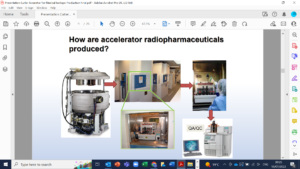
Dr. Cutler explained the importance of radiopharmaceuticals for the diagnosis and treatment of cancer and the detection and monitoring of cardiovascular disease and other diseases such as neurological and psychiatric diseases. She explained that the demand for radiopharmaceuticals is growing, which requires a significant increase in the facilities that produce isotopes and an increase in the number of PET scanners, through which radionuclides are applied for the detection of diseases. She noted that, technologies are becoming more user-friendly, the private sector can invest in particle accelerators that produce radioisotopes, known as cyclotrons. Currently, there are only 1,200 cyclotrons and 5,600 PET scanners worldwide, the majority of which are in high-income countries.
Dr. Cutler stressed the enormous health and economic benefits of expanding access to accelerator technologies in developing countries. She related the impact that increased private investment in Brazil has had on the development of nuclear medicine in that country. Private sector investment has increased the number of cyclotrons from four to 17. This has resulted in the establishment of more nuclear medicine centres, collaboration with local universities to develop the workforce and more investments in the development of new radiopharmaceuticals. She also noted that these additional nuclear activities have increased the regulatory burden in Brazil, which has necessitated more government investment in the development of regulatory capacities.

Prof. Pillai concluded with a presentation on the benefits of electron beam and X-ray technologies for economic development and food security. The impact of climate change and the fragility of global supply chains, demonstrated by the pandemic, has made innovations in food security a major priority for many governments. He argued that cobalt-60, electron beam and X-ray technologies are the only proven, non-thermal, chemical-free technologies available to address food security and food safety. He emphasised that the increasing cost of radioactive sources and the security concerns related to these sources strengthen the case for investing in accelerator and X-ray technologies as alternative radiation technologies to i.a. improve crop production and increase the shelf-life of produce. Prof. Pillai emphasised that these technologies should be promoted as highly profitable investment opportunities.
He provided examples of the economic benefits to Pakistan and Mexico of establishing accelerator facilities, which have increased their export of fresh fruit and other products and resulted in direct job creation at the facilities and, on average, 1,000 jobs in supporting industries such as logistics and manufacturing. He noted that, while the availability and use of e-beams and X-rays are expanding globally, this is not yet the case in Africa. Prof. Pillai believes that private sector investment is the key to improving the adaption and uptake of these technologies in developing countries.
The panellists agreed that accelerator and X-ray technologies are a safe and scalable opportunity for developing countries to address the urgent environmental, health, and food security challenges they face. Scientific innovations have significantly reduced the size of accelerators, so that they can be deployed faster and at a lower cost than before. While these technologies have none of the security challenges related to radioactive sources, there are other challenges that impact on their uptake in LMICs. New uses of accelerators and new accelerator facilities can be a challenge to regulatory bodies that may have to adapt their national legal and regulatory frameworks to these new technologies. Another challenge is the dependence of these technologies on electricity, which is not readily available in many developing countries. The technologies are, however, evolving and it was noted that many developing countries use generators to power data centres which use more electricity than accelerators. As these technologies become more cost-efficient, their benefits as low-investment, high-return opportunities for the agricultural and medical sectors will become more apparent, especially to private industries. Concomitantly, private sector investment would drive innovation. However, the panellists also agreed that international cooperation has an important role to play in facilitating the wider adoption of these technologies and to support research and development to improve the adaptation of these technologies to developing country conditions. In this regard the IAEA has a valuable contribution to make.
The full recording of the workshop can be found below.


